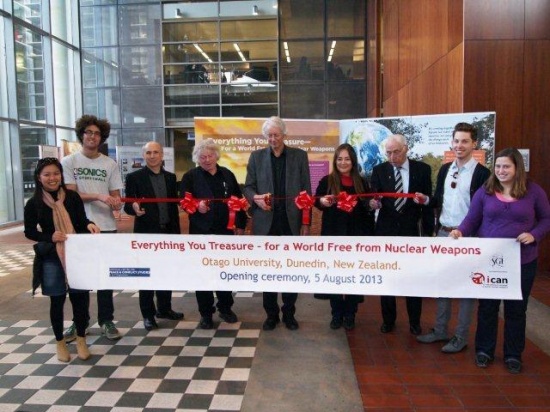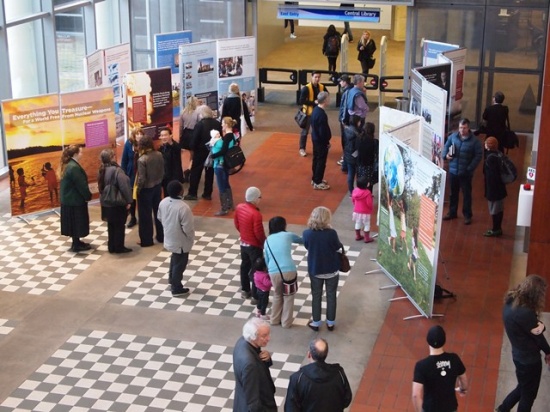
On 5 August, about 60 people gathered in the Otago University Library LINK, for the New Zealand launch of the exhibition “Everything You Treasure – A World Free from Nuclear Weapons”. Hosted by the National Center for Peace and Conflict Studies at Otago University, the exhibition launch was one of a series of events commemorating the 68th anniversary of Hiroshima Day (6 August). The exhibition was created by Soka Gakkai International and the International Campaign for Nuclear Abolition (ICAN) and was originally launched in Hiroshima in 2010.
Prof Kevin Clements, Director of the National Center, said it was an honour for Dunedin to be the fourth city to host the exhibition, after Hiroshima, Oslo and Geneva and thanked SGI New Zealand for agreeing to bring the exhibition to New Zealand in short notice. “They wanted to bring the exhibition to London next but I said “Why not Dunedin?” he joked.
Other speakers at the launch were Mr Ted Nye (representative of the International Physicians for the Prevention of Nuclear War (IPPNW)), Grant Gillet (Professor of Medical Ethics, Otago University) and Jimi Wallace (General Director of SGINZ).

There was praise for the new exhibition. It consists of 40 panels covering nuclear weapons issues from 12 perspectives: humanitarian, environmental, medical, economic, human rights, energy, scientific, political, spiritual, gender, generational and security.
Ted Nye thought that the display is essential viewing “but particularly to anyone under the age of 40, or thereabouts, where the realities of a nuclear exchange are too remote to worry about. The display is a reminder that there must be sustained pressure on all nations, particularly the nuclear armed, to step back into a safer world with continual dialogue to dismantle nuclear armouries and the methods of delivery.”
Prof Grant Gillet said “The Hiroshima day exhibit is both thought-provoking and a stark reminder of the on-going need to engage with the issue and recall an episode that in the future will be seen as an horrific act of violence committed by some human beings in the name of military and political expediency. The exhibit promotes, however, not just sober reflection but also affirmative action to play a part in making any repeat of what happened unthinkable for future humankind. Complete abolition of nuclear weapon capacity should be the only acceptable position for humankind going forward and the more that every person in every country realises the absolute necessity of that stance the safer we all shall be.
The next day, a peace vigil was held at the Peace Pole in Otago university which was attended by 80 people. That evening, a public debate “that New Zealand is safer out of ANZUS and Nuclear Free” took place between Prof Kevin Clements and Grant Hensley (former diplomat under Robert Muldoon and head of the Prime Minister’s Department under David Lange).
The exhibition will remain in Otago University until 16 August.